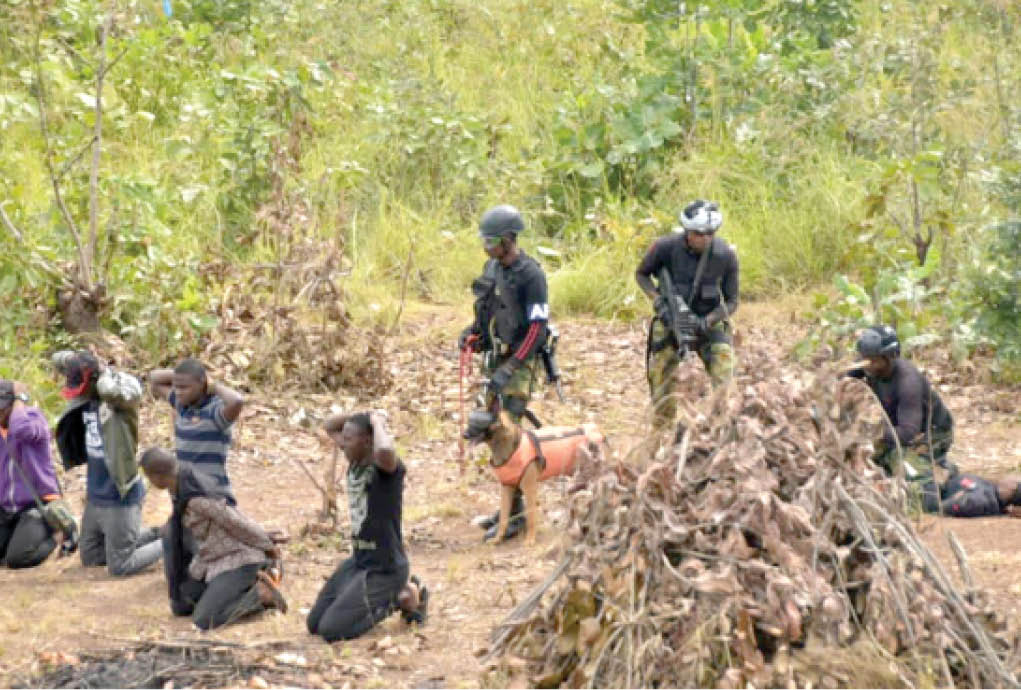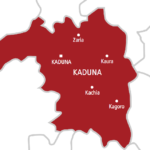Many states in the northern part of the country are blessed with vast forests. The importance of forests to human existence cannot be underestimated. According to experts, forests are home to about 80 percent of life on earth. Animals – big and small, depend on healthy forests, which provide them with the fruits, nuts and plants they need to thrive.
But some forests in northern Nigeria, which are ideally supposed to be sources of blessings to the people, have rather become a curse for them. Criminal elements including bandits, kidnappers and terrorists have found some of these forests a haven to unleash mayhem on innocent people. Our correspondents examine some of these dangerous forests and the heinous activities being perpetrated there by criminal elements.

- Kaduna: Kamuku, Kuyambana forests still shielding bandits
For many residents of Kaduna State and environs, the mention of Kamuku and Kuyambana forests create a sense of fear and despair, being the foremost fortresses for bandits in the state and parts of the northwest. Security agents have described the two forests as some of the most dangerous in the country and are often compared to the famous Sambisa forest in the northeast.
Our correspondent gathered that Kamuku forest extends to Birnin Gwari, Chikun, Kajuru and Kiwa local government areas of Kaduna State and shares boundary with Zamfara, Katsina, Kebbi and Niger states. Kamuku and Kuyambana forests adjoin the Kamuku Park located adjacent to the Kuyambana Games Reserve which is about 14km away from Kaduna main town.
The park, established in 1936 as the Native Authority Forest Reserve of Birnin Gwari under the Northern Nigerian Government and later upgraded from a state Game Reserve to a National Park in May 1999, was closed down due to activities of cattle rustlers and bandits. Lately, on September 27, 2020, bandits from the forest kidnapped a nursing mother and five others at Jigi village in Udawa town in Chikun LGA and demanded N10m ransom.
Shortly before then, it was reported that bandits stormed a small settlement a few kilometers away from Udawa town, shooting sporadically before picking three females and three males. Several communities around the forests have experienced constant loss of lives and property with many sacked by the bandits.
In July 2015, governors of the affected states which share boundary with Kamuku and Kuyambu forests had collaborated in a joint operation involving the army, air force, police and other security agencies to launch an operation that will exterminate and arrest suspected terrorists and bandits within the forest.
Daily Trust recalls that in spite of the operation, not much success has been recorded, as the two forests continue to serve as cover for criminals.
Ibrahim Munzali who lives in Galadimawa, in Giwa Local Government Area, which shares boundary with Kamuku forest, told our correspondent that the people are constantly under attack by bandits who invade their farms and communities to kill, maim and often kidnap women and children.

Munzali, a farmer, explained that “recently, they abducted three women and demanded for ransom which we have not been able to pay. I no longer go to the farm for fear that I may be kidnapped. The security agents know where the bandits are but they cannot access the forest because it is vast.”
Daily Trust reports that Nigerian Air Force (NAF) aircraft including the Beechcraft KingAir, Augusta 109 power helicopter, the Alpha jet and the MI35 all took part in bombarding parts of Kamuku forests in Katsina, Kaduna, Zamfara and Niger states as part of Operation ‘Kashe Mugu 2’, the air component of Operation Thunder Strike.
- Borno: Boko Haram insurgents are ‘landlords’ in Sambisa forest
The notorious Sambisa Forest in the southern part of Borno State, located along the Lake Chad shores near Nigeria’s border with Cameroon, used to be a game reserve where wild animals such as elephants strayed in from other countries, but constant hunting and other human activities drove most of the wild animals away. Mohammed Amin, a Maiduguri resident, said people visited the forest for wild life tourism in the past but that the lack of ethical standards led to the increase in environmental and wild life crime which eventually posed threats to plant and animal species.
But the Boko Haram insurgents, driven out of major towns by both the military and civil defense forces, have sought refuge in Sambisa and the nearby Mandara Mountains from where they sneak out to launch attacks on their targets.
The military had traced some of the insurgents’ camps to the forest at different occasions and dislodged them; yet, the terrorists move deep into the forest to evade arrest.
An journalist, attached to troops who surveyed the forest on helicopters, said the area consisted of some dense vegetation of short trees where the terrorists had makeshift shelters for accommodation and logistics.
“Arms and ammunitions as well as facilities for the assembling of homemade explosive devices were recovered in the forest in many raids,” he said.
People kidnapped by the insurgents including some schoolgirls were said to have been hidden in the forest; some victims were rescued by the military in few of their raids on the insurgents’ hideouts while other kidnapped victims escaped from where they were hidden according to a 13-year-old girl who was seized while working on her parents’ farmland and forced to marry a terrorist.
The teenager, who spent a year in the forest, said “When the man I was forced to marry left our camp for two days, apparently on a short trip, we fled and reached the main road after trekking for hours.”

A victim, Hajia Falmata, said she was kidnapped by the insurgents and taken to the forest where she spent some days before she escaped. Her two male kids taken to a separate camp are still there.
Terrorists living in the forest have attacked neighbouring settlements at different times and sacked towns, including neighbouring Gwoza and other local government areas.
Surprised attacks carried out by terrorists living in Sambisa interminably had forced residents to flee the area, leaving many ‘ghost’ buildings, said another source, until recently that the state government started returning displaced persons to their ancestral areas. People in Gwoza, Banki, Bama and nearby Kawuri towns have returned to their homes.
Many of the insurgents and their leaders are said to be hiding in various camps in the forest according a security source, even when troops frequently raid their enclaves.
- Kano: Falgore, Gomo forests still den of criminals
There are two dangerous forests in Kano State namely – Falgore Forest in Doguwa Local Government Area and Gomo Forest in Sumaila Local Government Area. Both forests had been dens for series of criminal activities over the years.
In 2014, gunmen suspected to have emerged from Gomo forest attacked Sumaila divisional police division station, injuring two policemen and setting free some criminals in detention at the division. It was also gathered that resident Fulanis and farmers in the area have been victims of kidnappings and cattle rustling over the years.
It was also gathered that the Gomo forest is linked with Bauchi State’s Yankari forest and as such, criminals usually navigate at will across the forest boundaries to unleash mayhem on innocent villagers.
According to a resident of Gomo, Ibrahim Tanko, many people have been forced to dispose their livestock and relocated to other safer places.
“Hardly will you find a home with more than two cows these days because it is either the rustlers have stolen all or kidnappers have demanded for ransom that necessitated the sales of the cows. That was why many people have been forced to relocate to safe places,” he said.
Similarly, criminal activities along the Falgore Forest in Doguwa Local Government Area has been going on for quite a long time. The forest has become den for bandits, cattle rustlers, kidnappers and other nefarious activities of men of the underworld.
Due to its continued threat to human lives, the leader of the House of Representatives representing Tudunwada and Doguwa Federal Constituency, Alhassan Ado Doguwa, recently called for aggressive security operations to rescue his constituency when he paid a courtesy visit to the Kano State police commissioner.

Also, to strengthen the security activities around the forests, the Kano State government had converted the forest bank to military training ground with the recent inauguration of multi-million naira facilities. The initiative by the state government was a strategic move to nip the incessant invasion of criminal attack on communities and commuters in the bud.
The bandits residing in these two forests have been there for years, terrorizing communities in Doguwa, Tudunwada, Kibiya, Sumaila and parts of Rano LGAs of the state.
- Nasarawa: Uttu/Kenyehu forest, home to terrorists
Uttu/Kenyehu forest and contiguous hills, in Toto Local Government Area, could be classified as the most dangerous forest in Nasarawa State.
Recently, the Nigerian Army busted a terrorist cell in Uttu forest which led to the surrendering of 410 members of Darusalam which had held sway for about three years.
Toto Local Government Area shares boundary with Nasarawa Local Government Area in Nasarawa State, and is sandwich between Abaji in Abuja and Lokoja in Kogi State.
It could be recalled that on the September 20, 2020, the military and other security agencies conducted clearance operations in Uttu Forest and destroyed identified terrorists’ hideouts.
During the operation, 778 family members of suspected terrorists and bandits consisting mostly of women and children were rescued by troops.
Meanwhile, the state government has paved access road into remote villages from Umaisha – Adaosun/Sardauna – Uttu to Uguma- Kpokpobili – Uttu, and Igwapati – Uttu road in Nasarawa and Kogi states respectively to make it easy for the security forces to carry out their operations unfettered.
Chairman of Nasarawa Local Government Area, Muhammad Sani Ottos, said his council is seriously affected by the activities of armed men.
It could be recalled that recently, about 50 armed bandits abducted 30 people and killed two vigilantes in Nasarawa near Onda Hills along the Udege/Loko Road.
Also, 26 personnel of the FRSC were waylaid along the same road with some shot and others abducted by criminal elements.
The latest incident was when gunmen stormed Kana town and killed one person while 10 others were abducted.
Two years ago, a retired Assistant Controller General of Prisons, Nanvyet Wuyep Gwali, was murdered by unknown gunmen on his farm in Laminga, along Keffi – Nasarawa Road, Nasarawa State.
Some months ago, gunmen stormed Odu community and shot the traditional ruler, Mr. Amos Ewa Obere (ASP Rtd).
The traditional leader, who sustained serious injury in his stomach as a result of the gunshot, was rushed to Mararaba Udege General Hospital, where he later died.
On February 19, 2020, a woman who was on her way to Mararaba-Udege market was kidnapped. Police operatives swiftly sprang into action, combed the vicinity and eventually succeeded in arresting two of the suspected kidnappers.
Following the criminal activities around the forest and hills in the state, traditional ruler of Loko, Alhaji Abubakar Ahmad Sabo, who said “The recent attack on officials of the FRSC is a bad omen for travelers on this road,” appealed to the Federal Government to establish a military base there to enhance security in the area.
However, Governor Sule has restated that security of lives of the citizens was a priority of his administration and insisted that criminals must not be allowed to truncate the peace and economic activities in the state.
He expressed worry at the resurgence of insecurity in some parts of the state and admonished youths in the area to shun crime.

- Kebbi: Dansadau, Rafin Kuka forests, haven of bandits
Zuru Emirate, which encompasses four local government areas in Kebbi State, borders Niger and Zamfara states.
Armed bandits, who launch attacks on innocent citizens of the state, infiltrate into Kebbi State through Dansadau forest from Zamfara State and Rafin Kuka forest from Niger State.
Daily Trust gathered that the two forests, that crossed from Zamfara and Niger into the state, serve as camps for bandits who usually terrorise the people.
It was gathered that once bandits attack and abduct people to such forests, victims only regain freedom after ransoms are paid. According to some sources, many are not so lucky to secure freedom as they often get killed.
It was also gathered that even the Yan Sa Kai (local Vigilante) can only penetrate the forests with the assistance of military personnel because the two forests are said to be infested with bandits.
A resident of Zuru, who sought anonymity, said in the recent past, the Rafin Kuka forest which is not more than 100 kilometers from Zuru, used to be a peaceful abode where herders and farmers carry out their activities.
“The locals around the forests can’t go to their farms neither can you see the one-time peaceful herders running around the forest with their herds of cattle. Bandits rustle the cattle while farmers are maimed and killed in the process; the forest have been taken over by the criminals.
“Just few years back, everywhere was peaceful. One can move in and out of the places freely but now, you’d not dare it, otherwise you may become a victim,” he said.
John Mani, who is the leader of the Yan Sa Kai in the emirate, told our reporter that the presence of bandits in the forest made the area highly unsafe, adding that only armed security personnel can dare them.
Mani said the bandits kill at will, adding that the painful part was that they refuse to release the bodies of victims to their relations.

 Join Daily Trust WhatsApp Community For Quick Access To News and Happenings Around You.
Join Daily Trust WhatsApp Community For Quick Access To News and Happenings Around You.

